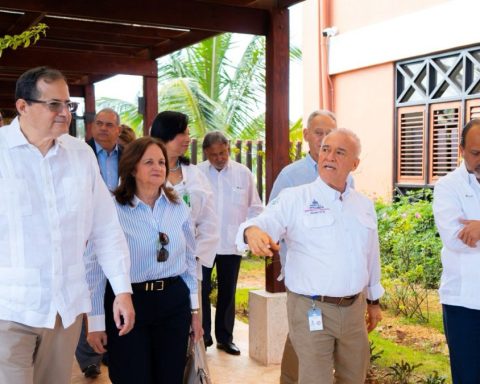Credicorp Capital recently presented the update of its economic projections for Colombia in 2024, in which it highlights that the country has shown strength in the midst of the complex panorama it faces due to the slowdown, but warns that they are still concerned about the balances left by the investment line, especially from the private sector.
In an interview with Portafolio, Daniel Velandia, executive director of Research and chief economist at Credicorp, said that although the energy and agricultural sectors have held their own in the first half of the year, it is not known how much longer they will hold out and to prevent things from getting complicated, the economy must be boosted urgently.
Credicorp’s fund will seek to provide 1 billion pesos to companies.
Private file
How did we do in the first semester?
Growth, especially in the first four months of the year, surprised us in a favorable way. We, and I think most of the market, saw at the beginning of the year, even since December, that the economy could have contracted in the first quarter by around 1% year-on-year and in the first quarter we had positive data that ended up being a very strong surprise.
The Ministry of Finance responds to Olmedo López’s remarks: ‘My innocence will prevail’
We thought that the Russia-Ukraine war or the El Niño phenomenon would hit hard, and even though it did happen, the country held on. The energy and agricultural sectors were the ones that helped or at least largely explained the surprise in growth. Now, it is not all about relaxation, as there are challenges and we have to see how sustainable this is and what needs to be done to strengthen it.

Daniel Velandia, chief economist at Credicorp.
Courtesy.
Did anything else affect it?
There is a third element here, and that is government spending, which has been criticized for its low execution. The truth is that in the first part of the year there was a higher execution than last year, mainly between January and April, and that was reflected in the sectors linked to the Government and that is quite in line with our expectations.
Ministry of Finance spending cuts in 2024: more than 40% could not be implemented
In addition, household consumption is gradually beginning to stabilise and the expectation is that in the future, in the coming months, as inflation continues to decline, the Bank of the Republic will give rates as private consumption improves.

Some of the upward revisions to GDP have been: Credicorp Capital (9.5%), Fedesarrollo (9.5%), BBVA Research (9.2%), Bancolombia (10%) and XP Investments (9.7%)
THE TIME file
Did we do better than expected?
Yes. The first quarter of the year was expected to be negative by 1% and it was positive by 1%. The data is there and it is not normal to have a forecast error of almost 2 percentage points in a forecast for a particular quarter.
Creg appointed Antonio Jimenez as the new director after the departure of Omar Prias
We don’t have much data yet, but April and May show that the recovery has been taking place gradually, but ultimately all this translates into the fact that, for example, we at Credicorp had a growth projection of 1.1 for 2024 when the year started and we are already at 1.8 and I cannot rule out that it will eventually be a little more than that. Precisely because of that good performance.

Indicators
PHOTO: iStock
And the slowdown?
It is clear that there is a slowdown, a cooling, which is natural due to the economic cycle, but when we see that unemployment rates are even lower than last year and that is the relevant comparison, then we have had favorable news.
Inter-administrative agreement is signed to extend the Bogotá Metro to Soacha
The important thing to note is that there were basically two sectors that led this surprise: agriculture and energy. If we think about how sustainable this boost will be, it probably won’t be that much, especially energy, because it was basically an issue associated with the El Niño phenomenon. So, there is good news, but also specific factors that will surely be reversed and need to be analyzed.

Economic recession
PHOTO: iStock
What about inflation?
We are going to maintain our projections. I think there are issues that have clearly worried the market a bit, such as what happened with the dollar. Note how a few days ago it reached $4,200 and now it has been below $4,000. I think there was an overreaction there and that is not normal. Now, as that normalizes, an inflationary impact will eventually be avoided.
Comptroller warns of multimillion-dollar fiscal irregularities in Dian management
Here we also have the whole diesel issue and my opinion in this case is that it will be very difficult for the Government to touch the price of diesel. Beyond what it has already announced, for the issue of truck drivers and others affected in this chain, it will be more complex. We were also incorporating some increase in diesel and that remains to be seen and it is a bearish bias on inflation in the sense that diesel prices will probably not rise as I was thinking.

Colombian pesos
iStock
La Niña phenomenon?
There may be colleagues and part of the market that are concerned about this phenomenon, but I have been taught and there are studies on the subject, which say that La Niña has a smaller impact on inflation and is even disinflationary at the beginning.
Food prices play a role in the fall in household spending in June
This is because when the rains are very high or are announced to come, what happens at first is that producers harvest or collect the crop before time. And in fact the quality of the products decreases a little, precisely because of the process or because it starts to rain and so on. And when the quality decreases or you harvest earlier, the supply increases.

La Niña phenomenon
iStock
Why are you concerned about investment?
If you notice, today we have regulatory noise in the most strategic sectors of the country. You have that in oil and mining exploration contracts are not awarded, it is a government policy, after the Government wants to intervene in the prices of electric energy, it has attempted to do so.
The entire energy sector is relatively at a standstill. Since last year, when changes in interest rate subsidies for social housing were promoted, there has been a very powerful impact on the real estate market that we are still seeing.

Investment
iStock
Added to this is the freezing of infrastructure and tolls, and the fact that investment execution is barely 22% as of June (National Budget). Here we must think that consumption will help us, it will be a driver of growth, the economy will continue to recover thanks to the fact that consumers have more disposable income, because inflation is falling, etc. But if investment does not recover, the country will hardly achieve growth of 3%.
Ministry of Education: Daniel Rojas’ resume is now published in the Presidency
Should we close 2024?
Well, let’s say from the point of view of 2024, I don’t rule out that we end up growing a little more than that 1.8% that we mentioned, which would be favorable, particularly if household consumption turns around a little faster and there are preliminary signs that something like that may be starting to happen.

Investment
iStock
However, the market is already starting to focus on 2025 for many reasons, including the fact that it is a pre-election year and that has an impact on the outlook for consumption and investment by companies. Everyone is going to be focused on that. This year is one of gradual recovery, but indeed, depending on how we close 2024, that will give us the pace of the economy for what is to come.

















